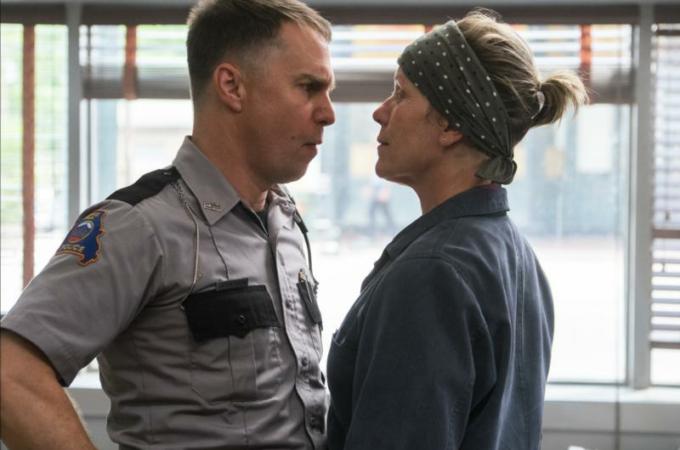Three Billboards Outside Ebbing, Missouri
NEW YORK (CNS) -- The dramatic power and serious artistic intent that mark writer-director Martin McDonagh's "Three Billboards Outside Ebbing, Missouri" (Fox Searchlight) are too obvious to be denied.
Taken together with Frances McDormand's majestic turn as this emotional dynamo of a film's tormented main character, these qualities would normally permit endorsement of it for a circumscribed group of adult moviegoers, despite its many seamy elements in dialogue and action. But a plotline justifying suicide in some circumstances as well as a vicious diatribe against the Catholic priesthood ultimately place this picture beyond the pale.
McDormand plays embittered divorced mom Mildred Hayes. Enraged by the stalled investigation into the gruesome rape and murder of her daughter, Mildred arranges to rent the structures of the title and has them plastered with signs attacking the local police. She specifically targets the small force's widely loved chief, William Willoughby (Woody Harrelson).
Mildred's action sets off a small-scale civil war in the community. This conflict gradually draws in Willoughby's violence-prone second-in-command, Officer Dixon (Sam Rockwell); Red Welby (Caleb Landry Jones), the mild-mannered head of the advertising company that owns the billboards' and James (Peter Dinklage), a dwarf who sells used cars and carries a secret torch for Mildred.
Mildred's teen son, Robbie (Lucas Hedges), and her ex-husband, Charlie (John Hawkes), also become embroiled in the clash.
Along with a Southern Gothic tone and eccentric but dignified minor characters who might have been lifted from the pages of that connoisseur of oddity, Catholic author Flannery O'Connor, McDonagh infuses "Three Billboards" -- initially at least -- with pitch-black comedy and a bleak outlook on the human condition. As the story progresses, however, glimmers of hope begin to shine through.
Villains prove redeemable and reconciliation possible, even in the most luridly extreme circumstances. This is not an ensemble of small-town folk who merely get on one another's nerves. They wound each other profoundly, sometimes emotionally, sometimes physically. So the forgiveness and forbearance McDonagh sometimes symbolizes with small gestures are correspondingly hard won.
Amid this overall web of positive, unsentimental values, though, darker threads are intertwined.
One character's suicide, for instance -- carried out rationally, if under duress -- is accompanied and followed by a long monologue in which his choice is romanticized and vindicated as a heroic sacrifice to marital and familial love. Yet the desire to shield those closest to us from pain can never make good an act God has universally and forever forbidden.
Earlier in the proceedings, a priest visits Mildred (a recently lapsed Catholic) to remonstrate with her about the strife her billboards are causing. In response, she launches into a tirade in which she compares Catholic clergymen to the members of violent street gangs and applies the principle of collective guilt to claim that even good priests are complicit in their evil peers' crimes against children.
This cruel and unreasonable denunciation will rightly outrage the sensibilities of Catholic moviegoers. Add to it the picture's ill-advised treatment of suicide and a climactic sequence that toys with justifying murderous revenge -- though the outcome is left unclear -- and the verdict on this aesthetically accomplished piece of cinema must be that it is spiritually unfit for all.
The film contains anti-Catholicism, a skewed view of suicide, an ambivalent treatment of vigilantism, some violence with brief gore, numerous profanities and at least one milder oath as well as pervasive rough and frequent crude language. The Catholic News Service classification is O -- morally offensive. The Motion Picture Association of America rating is R -- restricted. Under 17 requires accompanying parent or adult guardian.
- - -
Mulderig is on the staff of Catholic News Service.
- - -
CAPSULE REVIEW
"Three Billboards Outside Ebbing, Missouri" (Fox Searchlight)
Enraged by the stalled investigation into the gruesome rape and murder of her daughter, an embittered woman (a majestic Frances McDormand) plasters the structures of the title with signs attacking the local police, specifically targeting their widely loved chief (Woody Harrelson). Her action sets off a small-scale civil war in the community that gradually draws in the chief's violence-prone second-in-command (Sam Rockwell), the mild-mannered head (Caleb Landry Jones) of the advertising company that owns the billboards, a dwarf who sells used cars (Peter Dinklage) as well as the protagonist's teen son (Lucas Hedges) and ex-husband (John Hawkes). The dramatic power of writer-director Martin McDonagh's emotional dynamo of a film as well as the glimmers of hope he allows to shine through his bleak assessment of the human condition would normally permit endorsement for a circumscribed group of adult moviegoers, despite the many seamy elements in dialogue and action. But a plotline justifying suicide in some circumstances as well as a vicious diatribe against the Catholic priesthood make the picture spiritually unfit for all. Anti-Catholicism, a skewed view of suicide, an ambivalent treatment of vigilantism, some violence with brief gore, numerous profanities, at least one milder oath, pervasive rough and frequent crude language. The Catholic News Service classification is O -- morally offensive. The Motion Picture Association of America rating is R -- restricted. Under 17 requires accompanying parent or adult guardian.
- - -
CLASSIFICATION
"Three Billboards Outside Ebbing, Missouri" (Fox Searchlight) -- Catholic News Service classification, O -- morally offensive. Motion Picture Association of America rating, R -- restricted. Under 17 requires accompanying parent or adult guardian.



















